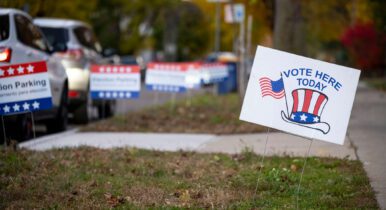Building State Parties Requires a National Staffing Strategy
Keeping state political parties well-staffed and well-resourced is a continual challenge. In this article, Virginia Democratic consultant Trevor Southerland explains the role the Democratic National Committee could play in keeping state parties across the country in the money.
Last year, the Virginia House Democratic Caucus picked up six seats and won the majority for the first time in 20 years, forming a Democratic trifecta in Virginia for the first time in 26 years. As executive director of the caucus, I organized more than 100 partner organizations, ran a $1 million-plus polling program, and led the caucus in making direct financial investments in some 40 percent of our races while running more Democratic candidates than had campaigned for the House of Delegates in modern history (92 of 100 districts).
We had a clear plan, an infrastructure that we assembled and held together through even the rockiest parts of the election (February 2019 — look it up), and a strategy that we never wavered from. But my most effective tool was my own history with the caucus. In 2017, I served as the deputy executive director when we picked up 15 seats. In 2015, I was the finance director when we picked up three seats.
In total, I was with the House Democratic Caucus for just under six years before leaving in March of 2020. That tenure made me one of the longest-tenured caucus staffers in the country. Most caucus staffers and state party staffers average no longer than one or two years in their positions.
The reasons for this vary. In some states, caucus programs are run through the state party. While these arrangements typically see the caucus having some control over that position and some buy-in for it, it’s not complete. In Virginia, however, our caucuses operate completely independent of the state party, and thus something as simple as a change in caucus leadership could lead to a staff turnover.
Most political operatives can make more money and have more room for advancement by working congressional races, gubernatorials, or going to a firm or national organization. State legislative caucuses and state parties often pay salaries that don’t lend staff to wanting to make a long-term commitment.
Some offer 401(k)s, but they’re usually lackluster in their matches. The one big benefit is often healthcare, and normally it’s top-notch. Still, for a career or a job you plan on holding for a decade or longer, the salary and other benefits begin to matter more and more each year. In the spring of 2017, my wife and I welcomed our son into the world. While I had always known about my lack of a retirement plan, entering my mid-30’s with a child reminded me of it even more.
Democrats have historically underfunded state races and drastically underfunded state legislative races. While the new attention on building from the state House up is great, one way to really ensure we can do that is by building our staffs as well. A big part of that is giving them reasons to want to stay at the state level.
The fact that I had been with the caucus for three cycles meant I knew the members well. Moreover, I knew the candidates and the districts – all those things about people and places that you can only learn over time. When I was on calls with those 100 partner groups, often with people with better resumes, salaries, and offices than mine – I was able to give specific information about what we were doing, and more importantly why we were doing it. They listened, not because they thought I was a genius, but because they knew I had been on the ground and had defendable reasons for making the decisions I was making.
I was completely transparent with our donors and partners. That developed a level of trust which allowed me to help direct resources where they most needed to be. That level of trust cannot be built in just one cycle. In fact, I was only able to achieve it because I was working my third cycle in a row in the Virginia House.
Another factor to our success: I was around during the “off-year” to work on candidate recruitment and building infrastructure for our election year. When the 2018 elections ended and national partners began to look at Virginia again, I already had a 50-page report ready on where we stood, what our recruitment efforts were and how fundraising was going in targets.
In 2017, one of our struggles was that national organizations spent a lot of money on polling, but so had the caucus. Those national groups didn’t feel bought into the caucus plan, so instead of giving cash to help reach voters, they needed to poll as well. In 2019, they were bought into our polling from the beginning and we avoided that, and other potential mistakes from a lack of coordination, allowing funds to be spent more wisely communicating directly with voters. Now, this isn’t possible in many states because of campaign finance regulations. But we can in Virginia, so we use that to our advantage — in the right circumstances.
In the aftermath of the 2020 election, a new chorus of “fund state parties” has sprung up. But here’s the deal: money from national organizations or large donors often comes with strings. Maybe they want you to invest in digital ads, or maybe it’s to pay for a data director. Both are incredibly important things – and I’m not against strings — but what state parties need most is a highly trained and qualified staff that’s invested and wants to build a career with that state party.
The next chair of the DNC should build our state parties by implementing a uniform staffing salary range and benefits policy, with a large chunk of money for state parties in compliance with these policies. For example, I would recommend something like this four-part test for funding:
1. A national salary that can then scale via every state’s cost of living. If you think a state party executive director in Virginia should make $XXX,XXX a year then you can scale that out to show what the same position should make in Tennessee or California, etc. The same should be said for other essential state party staff roles. If a state party is meeting the scale, they pass test one for funding.
2. An insurance plan that is a platinum standard plan covering partners and dependents. If a state party meets this obligation, they pass test two for funding.
3. A retirement plan that includes a good match and vesting after no longer than three years. If a state party meets this obligation, they pass test three for funding.
4. A commitment that any non-managerial staff (field organizers, etc.) can unionize with whichever union they wish and bargain a contract for their work. If a state party meets this obligation, they pass test four for funding.
Why does it have to be a little complicated? Simply put, we need to fund our state parties, but we also need to make sure our state parties don’t take the easy way out by just using money from the DNC to replace their own for funding staff, rather than adding to it.
This is an incentive to add and build, not just free cash to pass around. State parties all take every dollar of funding seriously. But especially in red or competitive states, they have to really take it seriously – often this means they sacrifice on staff salaries and benefits in order to keep the party afloat. But the constant turnover of staff and internal memory drain is more harmful than most realize.
I am fond of saying that politics hasn’t changed since the time of the Romans, except now we tweet. That’s especially true when it comes to when political money is spent. Many donors don’t invest until the fall of an election year. And most partner organizations come in around the same time meaning it’s hard for state parties, caucuses, or campaigns to build strong infrastructure early when fundraising is lacking.
We must solve that problem. In Virginia in 2019 we invested early in a robust polling program, focus groups, and the largest staff we had ever had thanks to an early commitment and investment from the DLCC, Gov. Northam, and other partners. It paid dividends. Maybe we would have won the majority without it. But we not only won a majority in 2019, we also successfully defended every incumbent member and gave ourselves a cushion on the majority (55-45, opposed to what the Republicans had in the previous cycle, 49-51). Credit for that goes to our early build-out and investment in staff and data — accomplishments we could have only made by having staff on the ground continuously for several years.
In addition to the state parties, the new DNC Chair should work with the DLCC to analyze which state caucus operations are run through state parties and which aren’t — then develop a similar plan to what’s set up for parties for caucuses as well. This is more difficult because every state is different from the next when it comes to caucuses. Still, nobody knows the state caucuses better than the DLCC and by working with them, you can truly help build the bench from the ground up.
There are several groups working to build a bench of candidates — who is building the bench of staffers? I would encourage whoever the next DNC Chair is to take this into consideration when planning the next phase of the national party’s development.
Trevor Southerland is a Democratic political operative who has worked for campaigns, caucuses, state parties and labor unions in several states, including the Virginia House Democratic Caucus, the Michigan Senate Democratic Caucus, the Democratic Party of Georgia and the North Georgia/Atlanta Labor Council (AFL-CIO) and various campaigns and causes. You can follow him on Twitter and LinkedIn.


